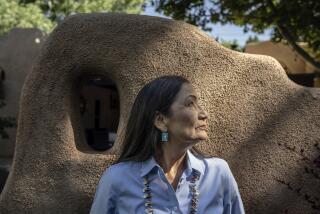Pointed questions await Ryan Zinke, Trump’s nominee for Interior secretary, at confirmation hearing
Pointed questions await Ryan Zinke, Trump’s nominee for Interior secretary, at confirmation hearing
Should the federal government transfer land to states or private ownership?
Should it roll back environmental regulations put in place by the Obama administration so that coal mining, oil and gas development and logging can expand?
Should the government consider the impact on climate change when it makes decisions about whether to allow development on public land or, say, protect endangered species?
And, for that matter, do you believe that human activity is the primary cause of climate change?
Those are among the questions Rep. Ryan Zinke (R-Mont.) may face later Tuesday when he goes before the Senate Committee on Energy and Natural Resources for his confirmation hearing to be Interior secretary.
Zinke, a former Navy SEAL who was one of Donald Trump’s early supporters in the House, met with the president-elect at Trump Tower last month amid speculation he could be under consideration for Secretary of Veterans Affairs or for a national security or foreign policy post.
Instead, Trump offered Zinke the job of running the Interior Department, which oversees the federal government’s vast holdings of public land, most of it in the West. It includes the National Park Service, the Bureau of Indian Affairs and agencies that regulate mining, logging and oil and gas development, hydroelectric power and water management in the often drought-stricken region.
The selection of Zinke, a former Navy SEAL, to head the department caught many people off guard. One of his House colleagues, Cathy McMorris Rodgers of Washington, had appeared to be the leading candidate. Since then, the confirmation process has raised a host of questions and concerns about precisely where Zinke stands on an array of contentious issues.
Conservation groups have largely condemned his nomination, pointing to Zinke’s support for mining, oil and gas development on public and tribal lands, his efforts to limit the use of the Endangered Species Act and his statements expressing doubts about climate change.
Zinke has also broken ranks with some Western conservatives over proposals to turn over federal public lands to states, which he has opposed.
Zinke has received hundreds of thousands of dollars in campaign contributions from the oil and gas industry. He has also faced questions about his use of government money for personal travel when he was a SEAL, which prompted discipline that slowed his advancement in the Navy.
Zinke’s confirmation, however, is not likely to be in doubt on the Republican-controlled committee, which is led by Sen. Lisa Murkowski of Alaska, who backs expanded energy development on public land.
Zinke casts himself as “Teddy Roosevelt Republican” -- an avid outdoorsman who believes public lands should be preserved for multiple uses, including hunting, fishing, recreation and energy development.
He has boasted of defying conservatives in his party on some environmental issues, including last summer when, running for reelection, he announced that he opposed Republican plans to transfer federal land to states. Then again, earlier this month, he voted for a measure that could make such transfers easier.
In a statement Tuesday morning, Zinke promised to work closely with states and local communities. “I fully recognize that there is distrust, anger, and even hatred against some federal management policies,” he acknowledged. “Being a listening advocate rather than a deaf adversary is a good start.”
Zinke also vowed to address what he called a $12.5-billion “backlog of maintenance and repair in our national parks.”
“Without question, our public lands are America’s treasure and are rich in diversity,” Zinke said in the statement. “I fully recognize and appreciate that there are lands that deserve special recognition and are better managed under the John Muir model of wilderness, where man is more of an observer than an active participant.”
“I also recognize that the preponderance of our federal holdings are better suited to be managed under the [Gifford] Pinchot model of multiple use using best practices, sustainable policies, and objective science.”
Sally Jewell, the current Interior secretary, made battling climate change a signature issue. In his statement, Zinke did not mention climate change. In the past, he has called the science on the topic unsettled.
Latest updates
More to Read
Start your day right
Sign up for Essential California for news, features and recommendations from the L.A. Times and beyond in your inbox six days a week.
You may occasionally receive promotional content from the Los Angeles Times.






